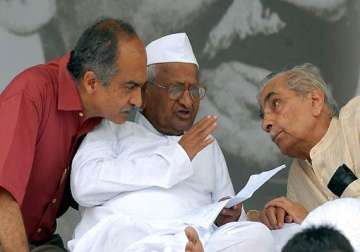Jan Lokpal Bill Criticised At Parliamentary Committee Meeting
New Delhi, Sep 24: Anna Hazare's Jan Lokpal Bill today came under sharp criticism at a meeting of the Parliamentary panel examining various drafts of the proposed legislation with most witnesses terming the activist's version

New Delhi, Sep 24: Anna Hazare's Jan Lokpal Bill today came under sharp criticism at a meeting of the Parliamentary panel examining various drafts of the proposed legislation with most witnesses terming the activist's version as “extra-constitutional”.
Legal and Constitutional experts, who deposed before the Parliamentary Standing Committee on Personnel, Public Grievances, Law and Justice, favoured strengthening of existing anti-graft institutions and keeping the judiciary, MPs and the Prime Minister out of the ambit of the proposed anti-corruption ombudsman.
Jay Prakash Narayan of Lok Satta Party, Pratap Bhanu Mehta of Centre for Policy Research, Bar Council of India Chairman Ashok Parija, eminent counsel Harish Salve and Justice Party chief Udit Raj appeared before the Committee today.
Narayan is said to have claimed that the Janlokpal, as proposed by Hazare, would become a “super constitutional body” that would be “dangerous” for the country. He favoured setting up a National Judicial Commission to look into matters related to the judiciary, including allegations of corruption.
Salve is learnt to have told the Committee that setting up the Janlokpal would be “unconstitutional” as it would lead to creation of a monolithic authority that would destroy the liberties enjoyed under the Constitution.
He is understood to have favoured strengthening of existing laws like the Prevention of Corruption Act and also strengthen institutions like the CBI and the CVC. Salve also favoured an independent prosecution wing for the CBI so that the agency can press for prosecution without waiting for the government to provide it with law officers to argue cases in courts.
He also favoured non-interference from the government in the investigations being carried out by the CBI.
Mehta and Parija were understood to have favoured upholding the sanctity of Article 105 that grants certain rights and privileges on members of Parliament for their conduct inside the House.
Mehta is learnt to have favoured keeping the office of the Prime Minister and NGOs out of the ambit of the Lokpal. He contended that bringing Prime Minister, the CEO of the country, under the Lokpal would weaken Parliament. Parija, who appeared before the Committee along with representatives of state Bar Council, felt that introducing a Citizen's Charter would be an “effective and workable” mechanism to check corruption.
He also favoured making CBI an independent Constitutional body which will be answerable to Parliament and not the government of the day.
Salve wanted all NGOs—both receiving government and private funds—to be covered under the Lokpal. He is also understood to have told the Committee that the setting up of Janlokpal, as suggested by Hazare, would create an institution above the Supreme Court which would be a mockery of the Constitution.
Narayan wanted the media to be kept out of the Lokpal ambit but wanted a “separate and effective” law to look into the functioning of the fourth estate.
Lokpal will not be able to take this burden he felt and underlined that a separate law was necessary given the increasing instances of paid news and false news that have com to light recently.
Meanwhile, Committee Chairman Abhishek Manu Singhvi said that the 10-hour discussions spread over two days were fruitful and intense and hoped that members would keep up the momentum for timely submission of the report to Parliament. PTI